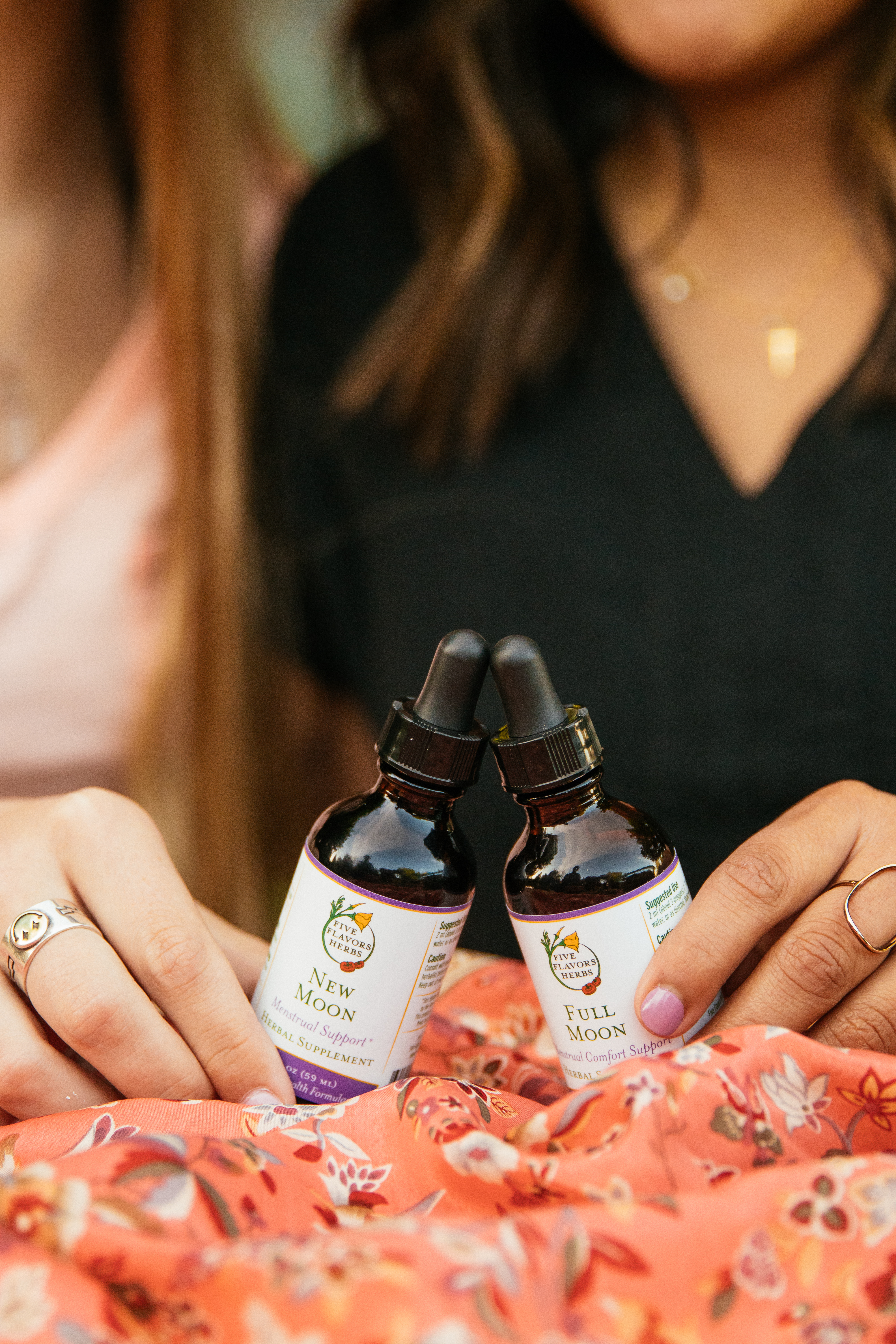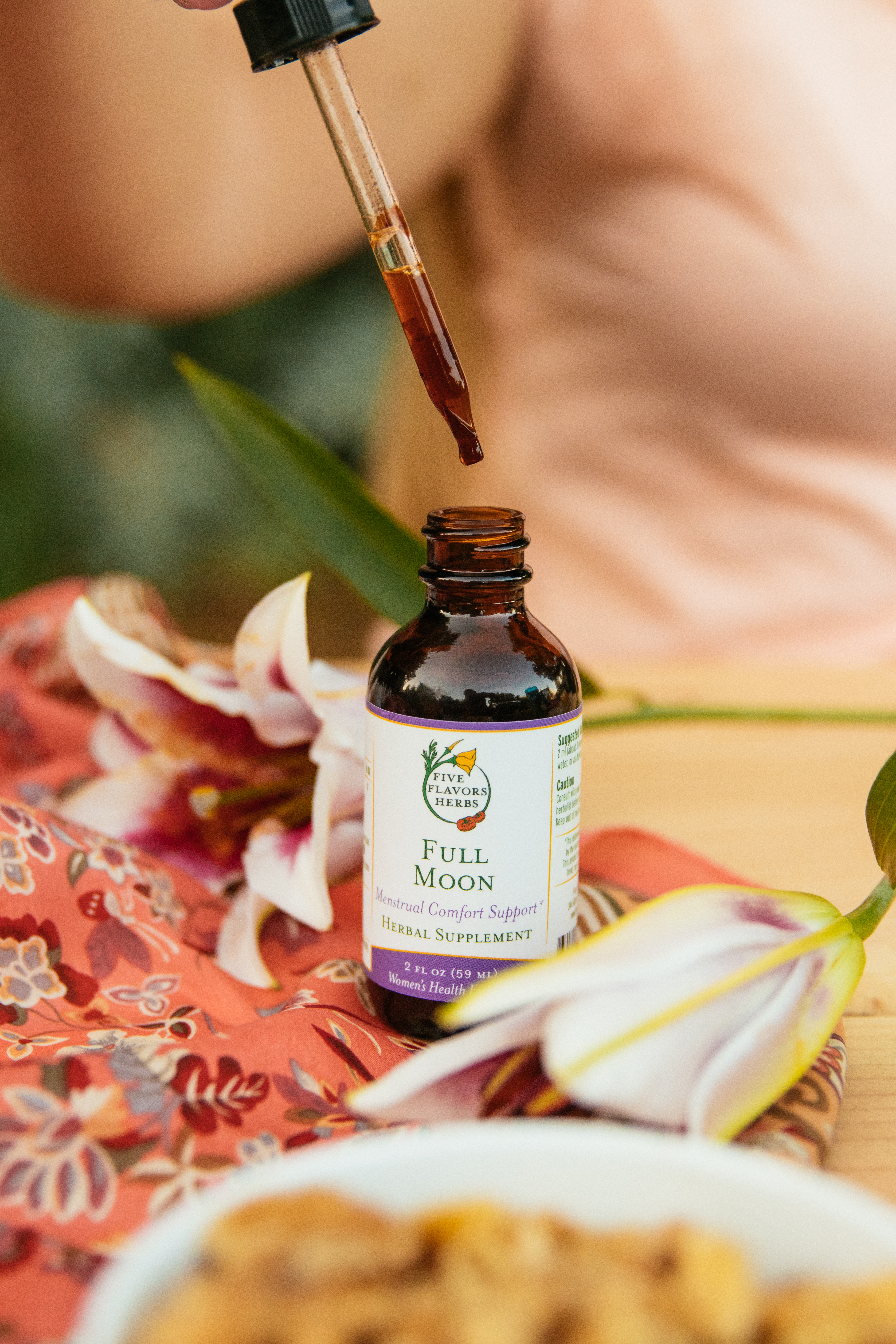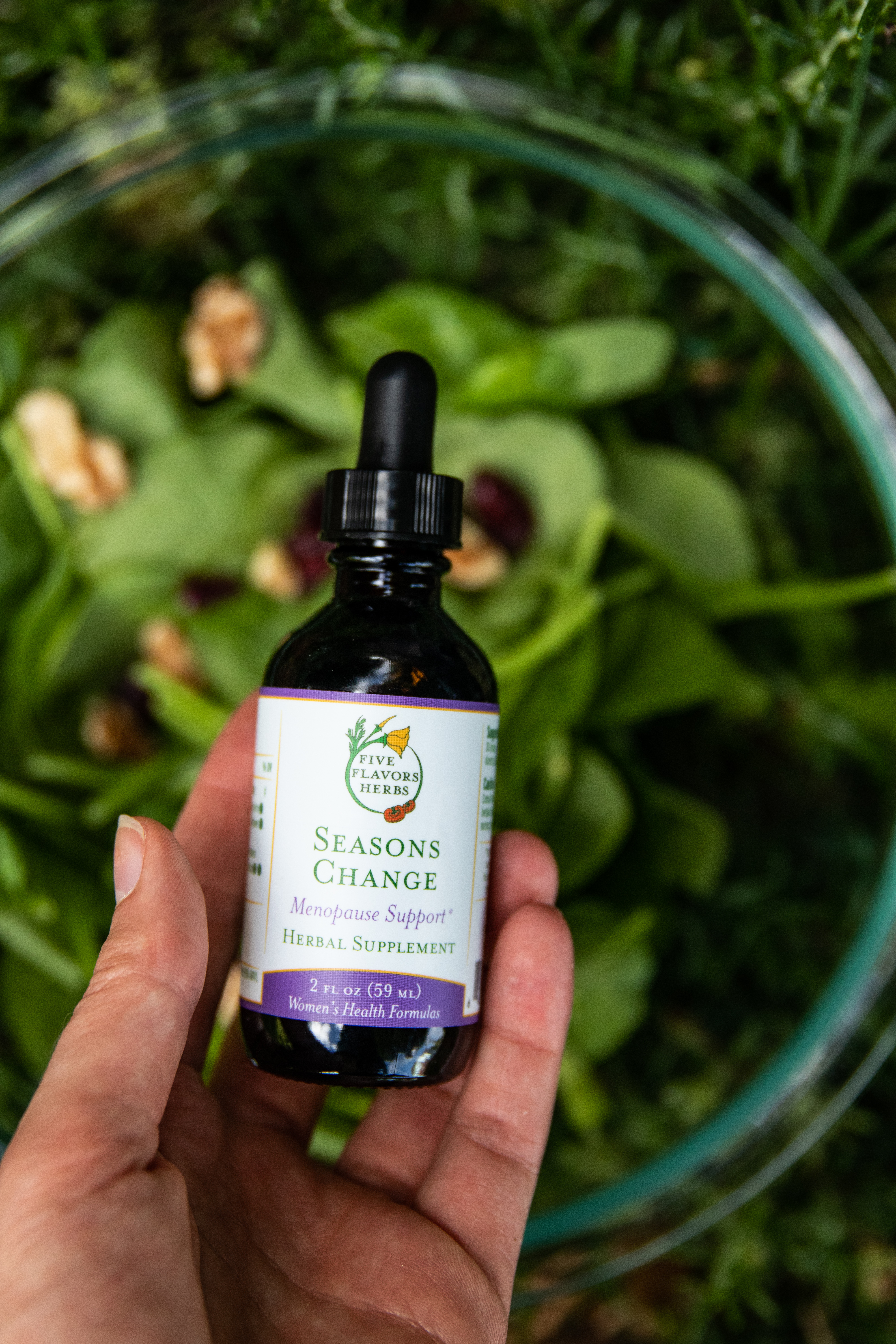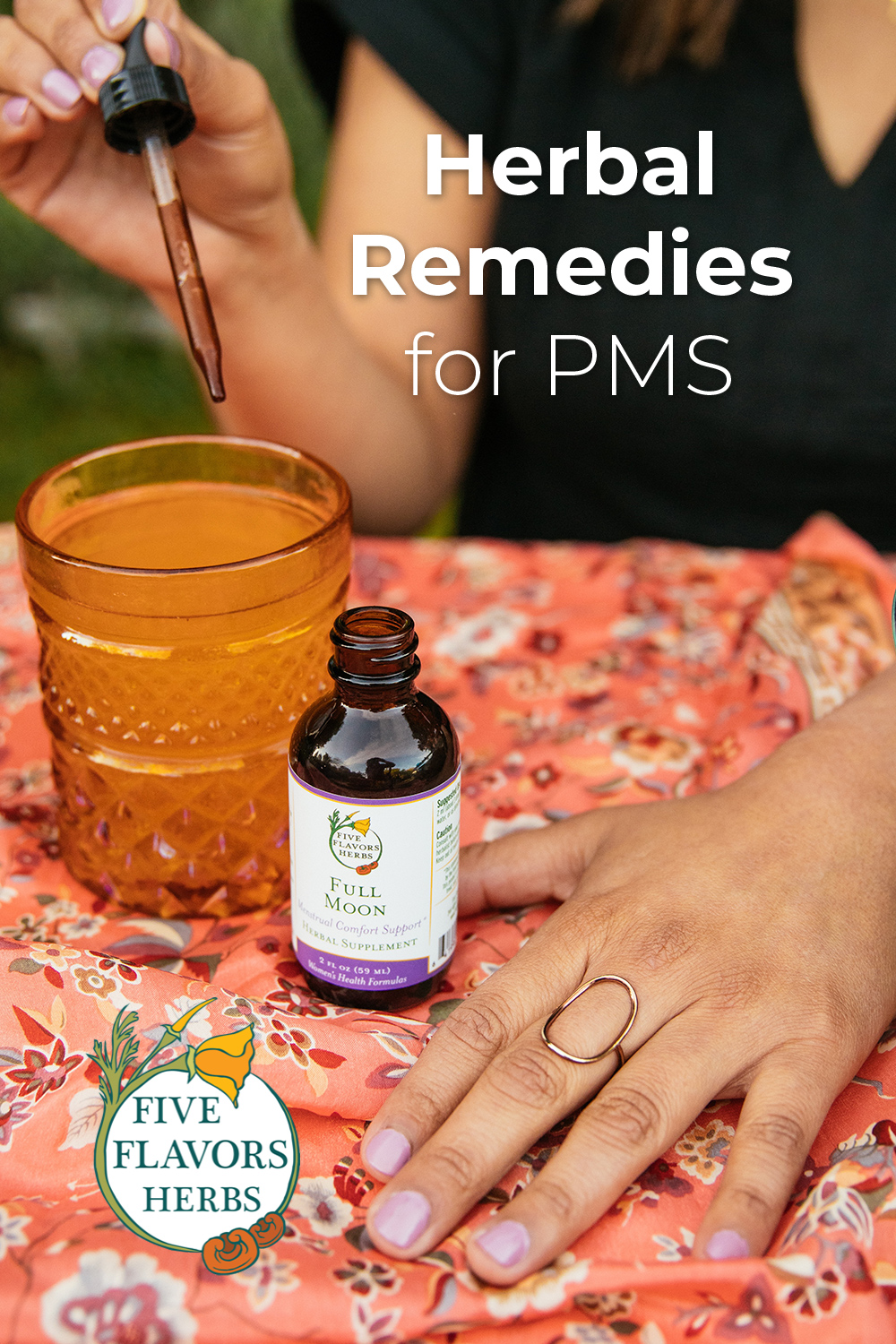Life transitions often bring about, reveal, and/or amplify underlying imbalances in the body. Traditional Chinese Medicine offers powerful tools for bringing the body back into balance throughout many phases of female reproductive health. From the onset of menses, to conceiving and carrying a child, to postpartum recovery, to easing the path through menopause, TCM herbal formulas and lifestyle recommendations offer natural methods for navigating each stage with greater comfort and grace.
Many formulas for women’s health have been documented for over 2000 years, with three chapters focused on the topic occurring in Zhang Zhong Jing’s Jin Gui Yao Lue (“Essentials from the Golden Coffer”). The formulas adopted by Japanese Kampo almost all originate from Zhang Zhong Jing’s writings and have become an integral part of the Western medical approach to gynecology and obstetrics.
Chinese Medicine for Menstrual Support
For many female-bodied people who menstruate, periods are a source of physical pain, emotional distress, and other challenges. Irregular cycles often cause worry about unplanned pregnancy or raise the question “is something wrong with my body?” Heavy periods can be painful and lead to anemia due to blood loss. Premenstrual symptoms like bloating, breast tenderness, acne, mood swings, irritability, and depression can make a quarter of a woman’s month quite a challenge. The Western medical tools available for regulating these imbalances—oral contraceptives, intrauterine devices, and antidepressants—are limited in their efficacy and often have side effects. Traditional Chinese herbal formulas, along with acupuncture, movement, and dietary prescriptions, offer holistic relief for many menstrual maladies.
Menstrual Imbalances According to TCM
There are many imbalances that can affect reproductive health and the experience of the menstrual cycle, and they may vary throughout the different monthly phases and stages of life. However, there are common patterns relating to qi dysregulation, Blood deficiencies, and stagnation, and these can often be addressed with a few standard TCM formulas.
The TCM principles of harmonizing the menstrual cycle are incredibly potent and reliable for resolving specific imbalances and symptoms. Many practitioners use traditional methods, informed by modern perspectives on illness and herb research, to correct or moderate many of the most common gynecological and obstetric health concerns with great success. Common complaints such as menstrual cramps/PMS are often easily remedied by over-the-counter TCM products, while more complex conditions may be addressed through customized remedies under the care of a skilled practitioner.
TCM REMEDIES THROUGHOUT THE MENSTRUAL CYCLE
Imbalances are expressed differently in different phases of the menstrual cycle. Practitioners and over-the-counter users of TCM products will commonly change formulas throughout the month to balance overall health and remedy the symptoms associated with each phase.
- Menstruation is the shedding and elimination of the thickened lining of the uterus through the vagina. The volume, color, odor, presence or absence of clots, and presence or absence of pain are important diagnostic indicators when choosing appropriate remedies for this phase. For example, the common combination of clotting with pain is a sign of Blood stagnation, indicating a need for herbs that move the Blood, such as Sichuan lovage root (chuang xiong), angelica (dang gui), and red peony (bai shao)—all of which can be found in our Full Moon Tincture for period support. This formula is built around the TCM formula si wu tang and is enhanced by fast-acting Western herbs cramp bark and black cohosh, which provide relief of cramping.
- Follicular phase begins the first day of menstruation and ends at ovulation. This is the time that follicles are developing in the ovaries prior to release into the uterus. From a TCM perspective, this is a valuable time to assess deficiency states and strategize supplementation or tonification strategies. Observation of energy levels, mood, pallor, and other non-menstrual specific symptoms can indicate a suitable strategy for supplementing the qi, Blood, yin, and or yang of the body. Traditional formulas commonly used to supplement in the follicular phase include Warm the Menses Decoction (wen jing tang), Eight Treasures Powder (ba zhen san), and Four Substances Decoction (si wu tang). Another product we dispense that’s excellent for support during this stage is Strong Woman Syrup.
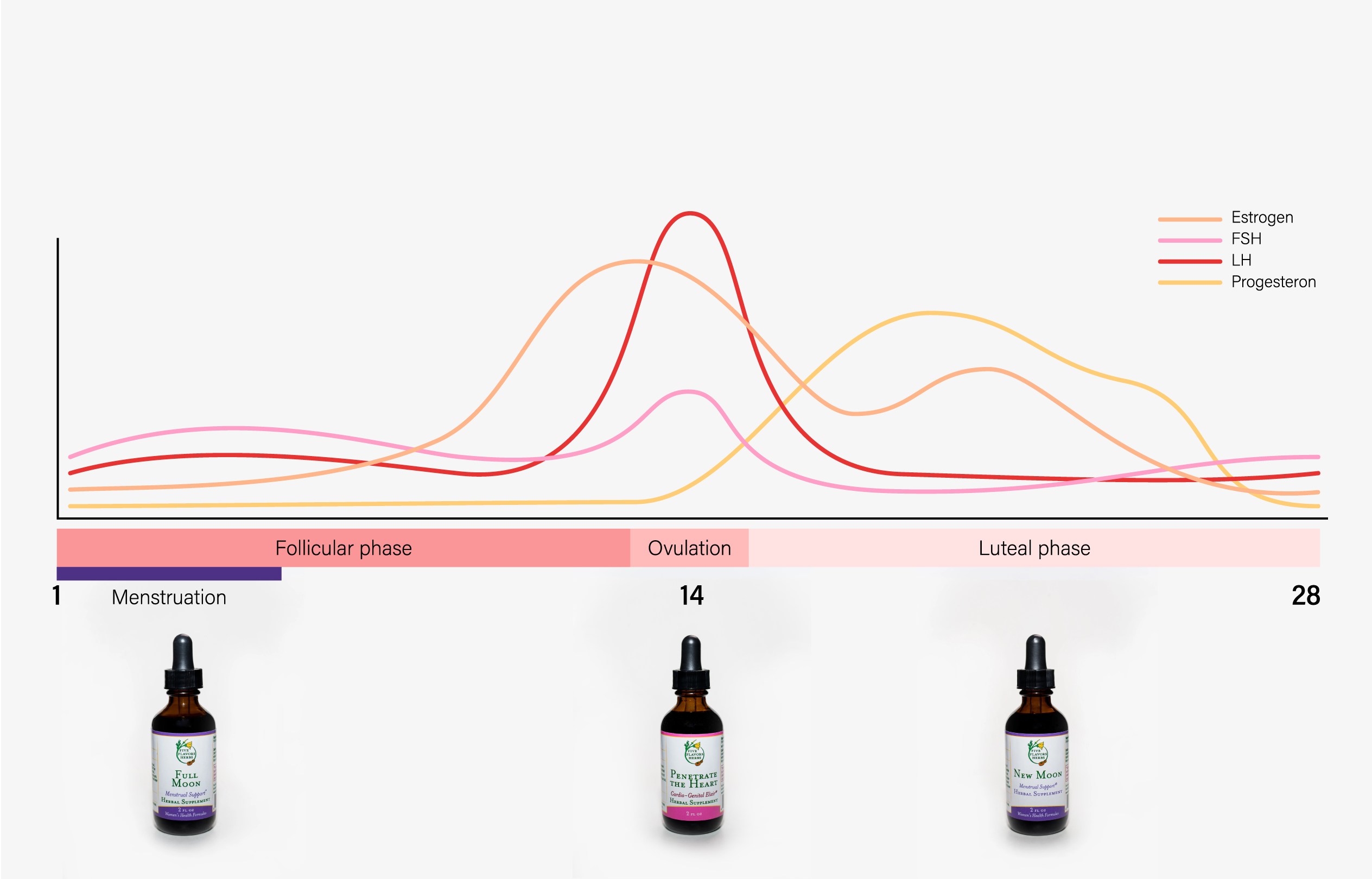
- Ovulation is the release of a mature egg through the fallopian tubes into the uterus. It is the window of fertility, and if the egg isn’t met by a sperm during this time, it will become unviable within about 24 hours. While practitioners don’t often recommend prescription changes during this phase, information gathered during ovulation can inform an overall health support strategy. TCM practitioners focused on fertility use a well constructed interpretation of Basal Body Temperature (BBT) to track ovulation, and they then formulate prescriptions around the cycle based on this reading. The experience of libido, while not focused on in classical or modern TCM texts, is an important indicator that can inform practitioners about the state of health. We’ve had many practitioners recommend our Penetrate the Heart formula for an aphrodisiacal spark along with other formulas to promote a healthy sex drive in accordance with TCM physiology.
- Luteal phase is when the lining of the uterus thickens in anticipation of a fertilized egg implanting. If the egg is fertilized, a cascade of hormones occurs to support its development. If the egg is not fertilized, the corpus luteum dies, the lining of the uterus sheds, and the cycle repeats. It is during this phase that PMS is commonly experienced, which may present with headaches, irritability, fluid retention, breast swelling and tenderness, rib side discomfort, and other mood fluctuations. TCM formulas commonly used to relieve premenstrual symptoms naturally include jia wei xiao yao san, xiao yao san, and other bupleurum formulas. Five Flavors Herbs’ New Moon, Elation, and Skull Soother are based on these constructs and are particularly well-suited for different expressions of PMS.
TCM Support for Menopause
Perimenopause is the transitional phase during which a woman’s body begins to gradually produce less estrogen, concluding with the cessation of ovulation. The experience of perimenopause (pre-menopause) typically starts in the 40s but may start as early as age 30, commonly with symptoms including irregular menses, hot flashes, night sweats, and vaginal dryness that may come with discomfort. It is very common for women to experience increased emotional distress associated with hormonal fluctuations, as well as irregularities in sleep.
TCM sees many of these complexes as a waning of the fluid aspects of the body, Blood, and yin. It seeks to remedy these deficiencies by providing supplementation via herbs such asparagus, rehmannia, and angelica. The Blood of the Liver in particular is related to both menstruation and sleep, and supplementation with Zizyphus combination or our Suan Zao Ren Tang Plus Tincture, formulated with passionflower and linden to help calm the mind and aide sleep, can be advantageous in addressing nighttime restlessness.
DOSAGE GUIDELINES
Traditionally, TCM formulas are prescribed as decoctions, with roughly 30 to 100 grams of herbs being boiled for 30 minutes in water before being strained and consumed as tea. For the tinctures we offer at Five Flavors Herbs, practitioners typically recommend taking two to three mL (dropperfuls), two to five times daily, depending on the therapeutic goals. Syrups can be taken by the spoonful one to three times daily.
TCM for Fertility & Postpartum Support
TCM is receiving an increasing amount of recognition in the Western world for its ability to support families wanting to have children. While its efficacy has been known in natural health circles for decades (our co-founder Ingrid Bauer’s mother conceived Ingrid in the late 1970s with the support of Chinese herbs!), TCM support for fertility has now become an important part of the wider integrative health landscape. Due to a convergence of evidence in published research and affirmative case reports, reproductive endocrinologists are commonly referring patients to licensed acupuncturists for fertility support.
Five Flavors Herbs offers Conceivable ProLine, a TCM liquid extract line developed to support fertility goals and women’s health in general. ProLine tinctures are specifically formulated to address subclinical health disorders that contribute to infertility, irregular BBT, weak menstrual cycles, irregular ovulation, painful periods, and other women's health concerns. These products are only available through practitioners, so if you’re interested in working with a practitioner using them to support fertility, check out our list of carrying clinics. We’re very honored to produce medicine in service to this facet of the cycle of life, and to collaborate with so many talented practitioners.
The efficacy of these products was put to the test in 2020, when many of our licensed acupuncturist clients had to shift to telehealth sessions because of COVID-19. This situation gave them the opportunity to observe what results they could achieve through TCM-based diagnostics and herbal formulas alone (without actual acupuncture), and they were thrilled to report that their success rates were just as high. Herbs work!
You might also enjoy:
- Spring Mood Support from TCM
- Jade Windscreen Recipes for Respiratory & Immune Support
- The Five Flavors in Traditional Chinese Medicine
Written by Benjamin Zappin, LAc: Five Flavors Herbs co-founder Benjamin Zappin is one of the Bay Area's most respected and knowledgeable herbalists and a licensed acupuncturist. With over 20 years of experience, Benjamin synthesizes his deep knowledge of Chinese and western herbal medicine with modern medical perspectives to create effective herbal formulas and treat patients. He serves patients through Paeonia Integrative Medicine.


